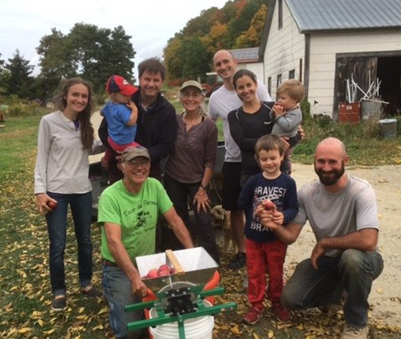By Laura Hardie, Red Barn Writer
How One Family Learned to Better Communicate Through Their Farm Transition
When Sam Burr and Eugenie Doyle of Last Resort Farm decided to conserve the farm in the early 90s, they shared a vision for their 272 acres in Monkton. “We always wanted to respect that this land would be undeveloped and a place to grow food beyond us,” Doyle said. “Our view of farming, in general, is that we are stewarding the land for whoever comes next.” When they conserved the farm and converted it from a dairy farm to an organic vegetable farm, their three children were young, and they didn’t know if any of them would want to farm. For many years none of them did. Until their son, Silas Doyle-Burr, took an interest in 2016 after working off the farm for several years.
“I was doing agri-business consulting for large companies, so it was mainly a cubicle job. I was never getting my hands dirty, and that was what I craved…I like balancing office and physical labor,” Doyle-Burr said. “When I came home, the needs of the farm and having clear management boundaries was hard because the family and management boundaries don’t always match.”
Though Doyle-Burr and his parents have a good relationship, they knew they would need support in the farm transition process, especially as it became clear that they weren’t exactly on the same page.
“Silas was chomping at the bit. He called the three of us working as co-operators a three-headed monster,” Burr chuckled as he thought back to the early days of the transition. Though Burr can laugh about it now, he acknowledges that it was a challenging time as they each figured out their roles.
“He was ready to take charge before we were ready to step back, and that is hard,” Burr said. “When your child is involved in the business, you have a different relationship. Those relationships are part of what your communication needs to be about. It can be tough for families to work through those things. It was for us and still is.”
The family sought support from several organizations, including NOFA-Vermont, the Vermont Farm & Forest Viability Program, and the Vermont Agricultural Mediation Program (VTAMP). The Vermont Farm & Forest Viability Program often collaborates with VTAMP on family farm transitions. The ag mediation program helps facilitate difficult conversations, and the Farm Viability program provides business expertise. VTAMP helped by interviewing each family member first to learn about their perspectives and facilitated several family meetings.
“We often see situations where the younger generation wants to try new things or take risks that the older generation doesn’t want to take,” VTAMP mediator Liza Walker said, “Or the next generation has a different vision for the future of the farm. We work with families to talk about expectations around their roles and how they communicate.”
Doyle said ag mediation helped them to listen to each other and create a path to move forward. “There are many aspects of a farm transition: legal, financial, technical, emotional; including giving up control and coming to a common-sense vision of what the future of the farm is, or not having a common vision – that’s where ag mediation comes in,” Doyle said. “They come into the tricky parts where there are rough edges, and I personally don’t know any transition that didn’t have any rough edges.”
Ultimately, the family developed a transition plan they all liked. In 2017, Doyle-Burr signed a 15-year lease-to-own agreement that allows him to run and eventually buy Last Resort Farm. “We are very grateful to ag mediation for listening constructively to what we all had to say…and helping us figure out the important and non-important issues. They were very good at that.” Doyle said.
VTAMP provides free mediation services to the agricultural community in Vermont on various issues, including farm loans, credit issues, farmer/neighbor conflicts, leases, USDA conservation programs, organic certification, wetlands determinations, and many more.
Doyle says her advice for families working through farm transitions is to use all the resources available to be successful because the process is worth it. “It’s not easy; family business transitions are not for the weak of heart. On the other hand, it’s also wonderful to have access to someone to take on the farm and to have input into how somebody is going to carry on the stewardship of a farm.”
For more information or to sign up for free mediation with VTAMP, visit www.VTAMP.org where you can fill out an online request form. Or contact Matt Strassberg at (802) 583-1100 ext. 101 or matts@emcenter.org.

Silas Doyle-Burr, front far right, poses with his family at Last Resort Farm. In the center are his parents, Eugenie Doyle and Sam Burr. Photo courtesy of Last Resort Farm.
